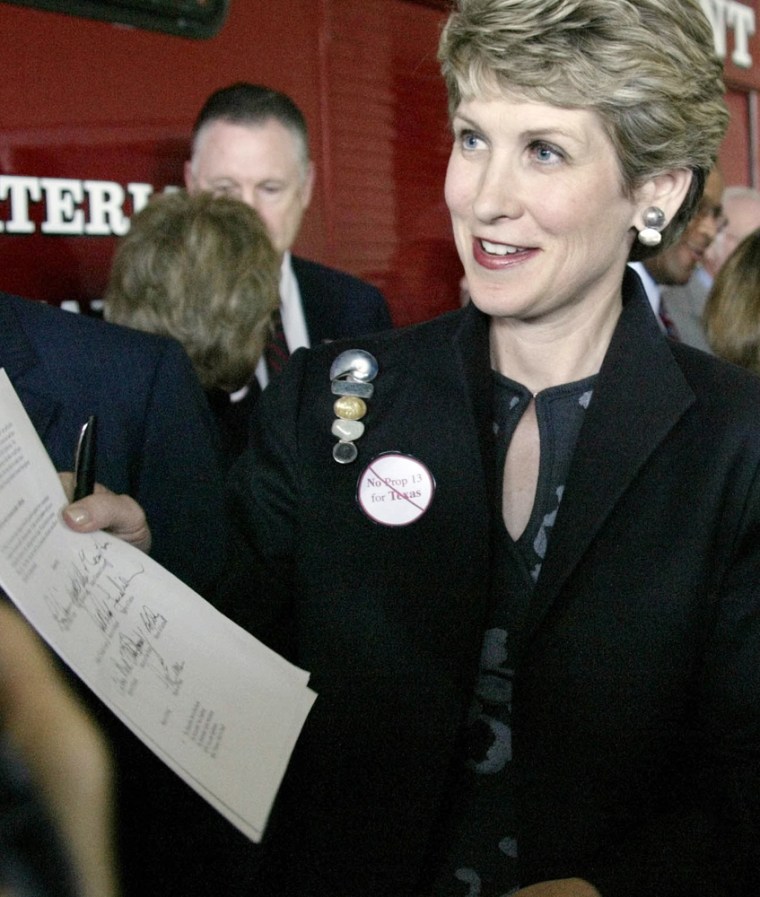Black voters, united in their disdain for Mayor Laura Miller’s outspoken style and what they call a disregard for southern Dallas, shocked many by turning out in record numbers to help crush a proposal that would have dramatically increased her power.
“I was surprised,” said Dallas County elections administrator Bruce Sherbet. “I’ve done this job for 18 years and I have never seen a turnout like I saw in early voting in the southern sector. It matched the turnout in the north part of the city, which never happens.”
Dallas, unlike cities such as New York and Chicago, designed its mayor to be weak, entrusting the real power to 14 council members who work with the city manager to represent the city’s diverse neighborhoods.
The proposal would have shifted the balance of power to Miller, who is white, freeing her to act swiftly to attack high crime and spark downtown investment and renewal. Opponents said the measure failed to ensure adequate checks and balances.
‘Made the black community angry’
“What Laura Miller has done is she made the black community angry,” said Rufus Shaw Jr., a political strategist who follows southern-sector politics. “And nothing fires us up more than when someone insults us and thumbs their nose at us.”
The south’s steady voting turnout on Saturday, paired with a split decision in the wealthier, predominantly white northern sector, led to a citywide turnout above 20 percent, more than double what Sherbet said he originally predicted.
Turnout in the city’s predominantly black districts was about even with turnout in predominantly white districts, averaging around 21 percent, according to city election figures. About 62 percent of Dallas voters rejected the proposal.
Shaw said he hopes the high turnout and its influence on the nonpartisan election will inspire blacks to return to the polls. “We weren’t just angry. We were organized,” he said. “I hope that this fire she’s lit in us stays burning.”
Miller, 46, did not return a message from The Associated Press on Monday. She said after the election that she believed Dallas residents wanted change in their city government and planned to work with the council to pass a weaker version of the proposal.
Rare signature drive
Attorney Beth Ann Blackwood got the proposal on the ballot by collecting tens of thousands of signatures, a rarity in Dallas. Opponents included former Mayor Ron Kirk and all 14 council members.
W. Floyd Lee, who owns an insurance agency in south Dallas, said he voted against the measure because it threatened to erode representation on the council that blacks fought decades to achieve.
“There were some people, I’m sure, who went and only voted on the strong-mayor proposal,” Lee said. “They did not want the air of dictatorship.”
Miller, who initially opposed the measure, later endorsed it after council members shot down her plan for altering how Dallas is run. She argued that the city needed a strong mayor to cut through Dallas’ bureaucratic system and find solutions to high crime and an ailing economy.
Miller’s enthusiasm for the ballot measure was viewed as a power grab by many blacks, who have grown increasingly irritated by her aggressive, go-it-alone approach and her public criticisms of Terrell Bolton, the city’s first black police chief.
‘Idiot’ comments on police chief
Many blacks blamed Miller for secretly orchestrating the ouster of Bolton, whom the city manager fired for poor job performance. Miller offended blacks all over again in a recent strong-mayor debate, when she referred to Bolton as an “idiot,” then refused to apologize.
Shaw and other black voters said Miller also has neglected the southern sector, a depressed, underdeveloped area struggling with high poverty and joblessness.
Miller has denied such accusations. On Monday, the city announced Miller’s plans to unveil a major economic development project being planned for the area.
Black voters in the southern sector have shown their strength at the polls before, notably in 1998 when they helped approve development of the Trinity River and construction of the American Airlines sports arena. The arena proposal drew a 21 percent turnout, according to Sherbet, the elections administrator.
Black voters said there’s little Miller could do now to win their trust. She is serving her first full term since taking office in 2002 to fill the unexpired term of Mayor Ron Kirk.
“I can’t see anything she’s done that helps the city of Dallas,” said W.A. Thomas, a 77-year-old retired teacher who was waiting for his tee time at a south Dallas golf course. “It seems everything has to be her way or no way.”
Still, election officials aren’t predicting a new dawn of political activism in black Dallas. “I don’t think it’s a one-time thing,” Sherbet said. “But I think it’s a rare occurrence.”
